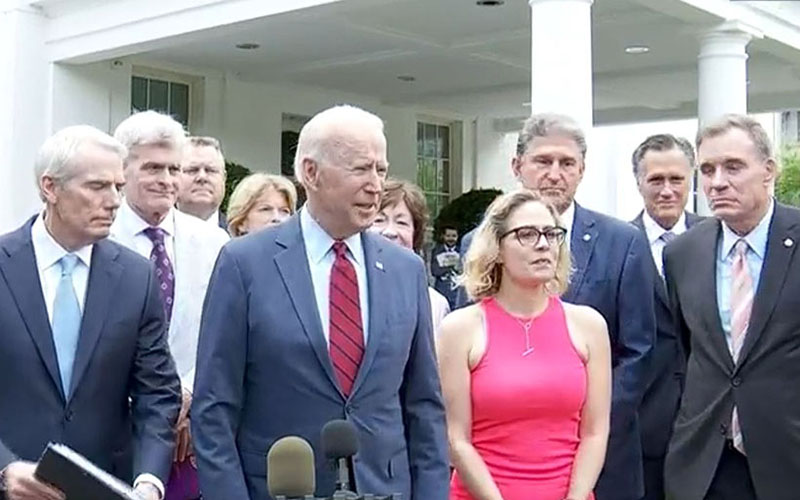WASHINGTON – Phoenix Mayor Kate Gallego joined other mayors and governors at the White House Wednesday to push for the administration’s $1.2 trillion infrastructure plan, a measure she has said is needed to reverse decades of “massive underinvestment.”
The meeting was part of a White House push for the plan that includes scheduled visits to Arizona by Cabinet secretaries Thursday to talk about infrastructure needs, as some Senate Republicans are balking at the overall size of the measure.
Gallego rattled off a laundry list of issues that need to be addressed in Arizona, ranging from transportation to water infrastructure, from wildfire protection to investments in semiconductor manufacturing.
She said after the meeting that people in Phoenix “want to be able to get to work, to school, to medical appointments as quickly as possible. We need infrastructure investment to make that happen.”
President Joe Biden expressed confidence before the meeting that a deal will be done, after a session earlier Wednesday with Democratic senators to iron out details of a bipartisan plan.
“I think we’re in good shape,” Biden said. “There may be some slight adjustments to the … payfors. And that’s going to get down to what the – what the Congress wants to do.”
But one expert said Democratic demands for trillions more in spending on “human infrastructure,” such as child care and college tuition, is endangering Republican support of the infrastructure plan.
Biden has called for a “two-track” process that would see the infrastructure bill twinned with human infrastructure spending that would be part of a budget reconciliation bill, which could pass the Senate with no Republican votes. The president repeated that call Wednesday, saying “the only way to get it done is having two tracks.”
David Ditch, a policy analyst at the Heritage Foundation, said that is causing Republicans who came out in support of a bipartisan proposal last month to have second thoughts.
“The bipartisan framework released a few weeks ago is what I would’ve expected for the most part,” Ditch said. “At the time, it looks like they had sufficient bipartisan support.”
But now that support is jeopardized, he said. Sen. Lindsey Graham, R-S.C., “has now backed away because of all the spending Democrats are promoting as a following reconciliation bill. Additional senators on the Republican side are no longer committing to supporting the plan,” Ditch said.
The White House is continuing its push in the meantime.
Transportation Secretary Pete Buttigieg is set to join local lawmakers at a Phoenix light rail stop Thursday before meeting later in the day with tribal leaders in the state to talk about needs in Indian Country. Education Secretary Miguel Cardona is scheduled to join Rep. Raul Grijalva, D-Tucson, on a tour of Tohono O’odham Community College to talk about proposed investments in education.
In a state fact sheet in support of its plan, the White House cited an American Society of Civil Engineers report card that gave Arizona a grade of C for its current infrastructure. The fact sheet said the state has 132 bridges and 3,100 miles of highway in poor condition, that it will need $9.1 billion in drinking water infrastructure improvements over the next 20 years and that 14% of Arizonans live in an area with no broadband access.
The administration bill would fund those needs along with improvements to and expansion of the power infrastructure and infrastructure resiliency due to climate and extreme weather.
Gallego spearheaded a letter Tuesday from 140 “climate mayors,” including three others from Arizona, that urged Congress to pass an infrastructure bill. And seven Arizona mayors were among the 369 who signed a U.S. Conference of Mayors letter this week calling on Congress to pass the bipartisan infrastructure framework that they said “would be the largest long-term investment in our nation’s infrastructure and competitiveness in nearly a century.”
Biden said before Wednesday’s meeting that mayors understand the need for an infrastructure plan, noting that there “are no Democratic roads or Republican bridges.”
But Ditch said it is not certain there is enough Republican support to get a package out of the Senate, which returned from recess this week.
“The timeline that has been put forward by (Senate Majority Leader Chuck) Schumer, who wants it on the floor next week, seems optimistic to me,” Ditch said. “But it’s impossible to predict exactly where it will go.”



